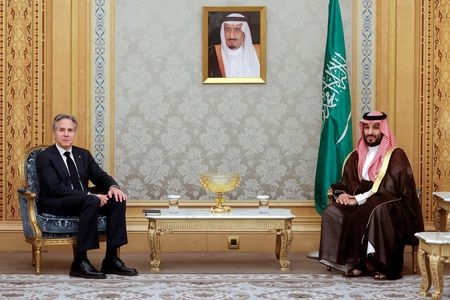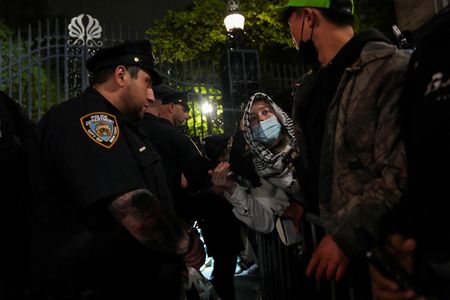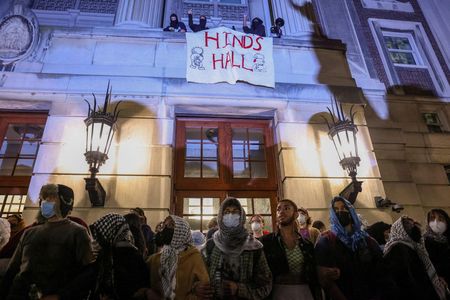In an interview with Time's Eric Cortellessa, Donald Trump laid out ideas of what he might do with a second term, including plans to consolidate power in the presidency.
Clip: Time's Eric Cortellessa on Trump's plans to consolidate power in a 2nd term
May. 03, 2024 AT 9:02 p.m. EDT
TRANSCRIPT
Notice: Transcripts are machine and human generated and lightly edited for accuracy. They may contain errors.
Jeffrey Goldberg: Apart from the Middle East conversation, which you kind of dipped in and out of, talk about two things, your impressions of Trump, cogency, grip on the issues, how the trials seem to be, or the trial right now and the pending trials, seem to be affecting his mood and concentration. And then tell us a little bit about what struck you the most about the things that he told you.
Eric Cortellessa: Well, I mean, Donald Trump appeared, as I write in the piece, you know, ever more assertive and confident. Right now, he feels like he's got a better opportunity to win the White House than he did at any point in the 2016 or 2020 campaigns. He's winning in most polls, including in several of the seven battleground states that are going to determine the outcome of the election.
So, you know, Donald Trump is in a position right now where he's planning, if he wins, to come into office January 2025 and to consolidate the power of government inside the office of the presidency. Donald Trump didn't really outline for me many legislative initiatives. He really wants to carry out his second term agenda through his executive authority. And that, you know, goes to his immigration plan, including carrying out a massive deportation operation that would remove as many as 11 million migrants from the country.
That goes to having a greater hand in Justice Department prosecutions than we've seen in previous presidents. He wants to restore the power of impoundment, which means to withhold congressionally appropriated funds. This was a favorite maneuver of Richard Nixon's who used it to hold money from the Environmental Protection Agency and affordable housing and was outlawed.
Jeffrey Goldberg: I was struck by that. It's not the most dramatic thing compared to immigration and abortion, but I was struck by that because didn't Congress pass laws after Nixon to restrict a president's ability to impound?
Eric Cortellessa: So, the Impoundment Control Act was passed in 1974 to restrict the use of congressionally appropriated funds. Donald Trump and his allies feel --
Jeffrey Goldberg: Aren't you glad you memorized that now? Yes.
Eric Cortellessa: I know more about impoundment than most Americans. But, look, Donald Trump has said and his advisers have said that they see that as unconstitutional and that they would try to challenge it through a variety of ways. They might engineer a legal battle for it. They might try to pass a law through Congress to overturn that Impoundment Control Act of 1974, if they have majorities in the House and Senate. Donald Trump wants to expand the powers of the presidency.
Jeffrey Goldberg: You call it the imperial president -- you say that he's trying to design an imperial presidency, imperial meaning concentration of power in one branch.
Eric Cortellessa: Yes, I mean, you know, concentrate concentrated power in one branch. And, you know, he wants to do things on his own through his own executive power. He feels that if he's won the election, that is a mandate for the vision that he has campaigned on.
Jeffrey Goldberg: Right. Asma, what struck you about the things that Donald Trump has been talking about recently? I know we were talking a little bit before about immigration.
Asma Khalid: Yes. I mean, the abortion is really noteworthy as well, how he spoke about abortion, and I'm curious what struck you about that, because, to me, that is single-handedly the most, I think, decisive issue that many Democrats see, and they think they have an advantage there.
He seemed to suggest, I guess, that he would not veto, it sounded like, a federal ban, right, if it came up to him.
Eric Cortellessa: We had a line of questioning where I asked Donald Trump, you know, quite pointedly, you know, President Trump, if a bill came to your desk that would impose any federal restrictions on abortion, would you veto it? And he said, I don't have to veto it. It will never happen anyways. We'll never have a 60-vote majority. So, I said, so just, will you not rule it out? You know, and I asked him at least three times, and he said, no.
And then I asked him about, you know, the functional outcome of his position, that this is a states' rights issue. You know, so I said, President Trump, would you be comfortable with states prosecuting women who have had abortions after the ban? He said it's totally irrelevant whether I'm comfortable or not because the states are going to make those decisions.
I said, President Trump, should states be able to monitor women's pregnancies, to know whether they've gotten an abortion after the ban? He said they might do that.
So, that is the ground that Donald Trump is going to trod in the coming months before the election, which is this is a states' rights issue, and states can make their own policies in whichever direction they want on abortion.
Jeffrey Goldberg: That's very dramatic. Also something that struck me as equally dramatic or in the same range is the promise or threat to use American troops, to use at least the National Guard, if not regular troops, to engage in roundups of illegal immigrants, of deport mass deportations.
Nancy Youssef: A violation of posse comitatus.
Jeffrey Goldberg: Yes. You're an expert, you covered the Pentagon. Tell me, when you hear that, do you think it's even plausible? I mean, we've spent years, among other -- me and you, writing about the Pentagon and its uneasy relationship, uneasy is almost euphemistic, with Donald Trump and his ideas of what the military should be used for.
What would happen if Donald Trump says to the generals, you're now being deployed domestically to get all these undocumented aliens out of the country?
Nancy Youssef: So it would be a violation of pasi comitatus, which was passed -- I did not memorize, so I might have it wrong, 1878. And the idea is that you cannot use the U.S. military to go after civilians. His answer to you was, well, they're not civilians.
The challenge that he puts his military generals in is they are not, under their oath, allowed to follow an order that is illegal or immoral, and he would put that question potentially to them to have to answer.
And also, we have really taken pride in this country. You know, most militaries in the world are built to combat internal threats. The United States military is built for external threats. And once you start having boots on the ground and uniforms on American streets, it changes the very relationship the United States military has with the American people and its function in our country.
So, we saw that on January 6th. It was startling in some ways to sort of see people in uniform going after the protesters because I'm not used to seeing it. That would be another extension of it. It becomes a legal challenge, some would argue, and it really forces the military to make a decision between how they interpret the law and how to follow the orders of the commander-in-chief.
Jeffrey Goldberg: You think he was bluffing?
Eric Cortellessa: I think that if there's anything Donald Trump plans to go full throttle on in a second term, it's immigration. You know, he's planning, if he wins, so day one, a slew of executive orders that would restore the policies he had in place in the first term, remain in Mexico, Title 42. He's going to allocate money, probably from the military, to resume construction of the border wall. But when it comes to this deportation operation, you know, Donald Trump doesn't want to not fulfill this particular campaign promise.
So, you know, I asked him some very specific questions about how he would do that. And as you say, he would be willing to use the military. You know, I asked him about the U.S. law that prohibits the use of military on civilians. He doesn't consider undocumented migrant civilians. There are other things he's going to do to try and, you know, expand presidential power in this realm. He said that he would try to induce local and state police departments to participate by tying federal funding to their involvement. He said if they don't, they won't partake in the riches.
Jeffrey Goldberg: Right. Frank, a few seconds left. Is Joe Biden doing enough from his perspective to stop Trump from using immigration the way he's using it?
Franklin Foer: I don't know if you can do anything to rig against this. What was incredible about this is just the way in which you got to see inside Donald Trump's spray and all the authoritarian ideas that are rattling around inside there.
FROM THIS EPISODE


Clip: Gaza war's impact on Israel's potential normalization with Saudi Arabia


Clip: Biden and Trump look to turn Middle East conflict and campus unrest to their advantage


Full Episode: Washington Week with The Atlantic full episode, 5/3/24

© 1996 - 2025 WETA. All Rights Reserved.
PBS is a 501(c)(3) not-for-profit organization
